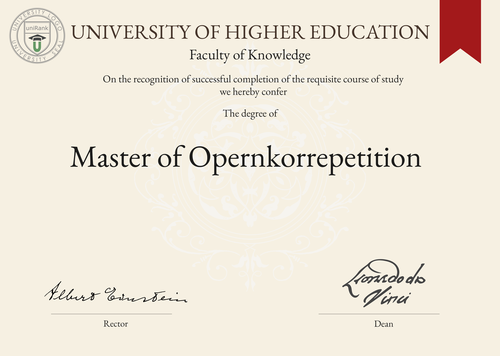
Master of Opernkorrepetition (M.O.K.)
Guide to Master of Opernkorrepetition Program/Course/Degree
Master of Opernkorrepetition (M.O.K.)

Program Name
Master of OpernkorrepetitionProgram or Degree abbreviation
M.O.K.Duration range
The duration of the Master of Opernkorrepetition program can vary depending on the country or university, typically ranging from 1 to 2 years.Tuition range
Tuition fees for the Master of Opernkorrepetition program can vary depending on the country or university, typically ranging from $5,000 to $30,000 per year.Overview
The Master of Opernkorrepetition program is designed to provide advanced training in opera coaching and accompaniment. Students develop their skills in vocal coaching, score reading and conducting, preparing them for careers as opera repetiteurs or vocal coaches.Curriculum Overview by year
The curriculum of the Master of Opernkorrepetition program is structured to provide a comprehensive understanding of opera repertoire and performance. The program typically includes courses in vocal coaching techniques, score analysis, opera history, language diction and conducting. Students also have opportunities to collaborate with singers and participate in opera productions.Key Components
The key components of the Master of Opernkorrepetition program include vocal coaching, score reading and analysis, conducting, language diction and practical experience in opera productions. Students develop their musical and interpretive skills to effectively support and guide opera singers in their performances.Career Prospects
Graduates of the Master of Opernkorrepetition program can pursue various career paths in the opera industry. They can work as opera repetiteurs, vocal coaches, or accompanists in opera houses, music academies, or as freelance professionals. They play a crucial role in the preparation and rehearsal process of opera productions.Salary Expectations
Salary expectations for graduates of the Master of Opernkorrepetition program can vary depending on factors such as experience, location and the specific job position. As a general guideline, opera repetiteurs and vocal coaches can earn an average salary ranging from $30,000 to $70,000 per year. For a more accurate understanding of salary expectations, you can utilize the Job Sites Search Engine, from our sister site jobRank, which searches over 4,600 job sites worldwide. Make sure to specify not only the job title but also the country you are interested in.Conclusions:
It is important to note that the duration, tuition fees, curriculum, key components, career prospects and salary expectations of the Master of Opernkorrepetition program can vary depending on the chosen country or location of study, as well as the chosen university. Prospective students are advised to research and compare different programs and institutions to find the best fit for their goals and aspirations. Visitors interested in pursuing a Master of Opernkorrepetition degree can use the uniRank World Universities Search Engine to search for institutions offering this specific degree anywhere in the world.World Universities Search Engine
search for Master of Opernkorrepetition (M.O.K.) and add the Location (country, state etc.) or specific University you are interested in studying at.
Query examples:
- Master of Opernkorrepetition (M.O.K.) United States
- Master of Opernkorrepetition (M.O.K.) United Kingdom online
- Master of Opernkorrepetition (M.O.K.) Australia international students
- Master of Opernkorrepetition (M.O.K.) University of California
- Master of Opernkorrepetition (M.O.K.) University of London tuition fees
- Master of Opernkorrepetition (M.O.K.) University of Sydney scholarships
Share Program/Course
Interesting? Share this program/course/degree info with your friends now.